- Home
- H A CULLEY
The Bastard's Son Page 7
The Bastard's Son Read online
Page 7
The old man told him that the villagers were used to fleeing, either to escape Ebbe’s voracious housecarls or Scottish raiders, but he thought that they would welcome more stability in their lives. Especially if it meant having a few soldiers to protect them.
‘They might even be prepared to pay something for it,’ he cackled.
Hugo left, having been assured by the man that he would pass on what Hugo had said and he decided to head for Harbottle next.
-X-
King William regarded the dead body and sighed. Lanfranc had been an invaluable supporter and, as the leader of the Church in England, he would be irreplaceable. Whoever took over as Archbishop of Canterbury would never be as loyal to William as Lanfranc had been. He had been his tutor as a boy and the bond between them was unshakeable. No-one else was as close to the king, nor would anyone be so close to him in the future.
He didn’t much care who the next archbishop was, just so long as he didn’t interfere with his right to rule his kingdom. He had enough problems with his brother over the channel to have to worry about the Church as well. However, the bishops were beginning to combine to support the doctrine that clergy should be above secular law and should only be tried in ecclesiastical courts. This was something that William, and many of his barons, were totally opposed to as it would mean that a priest or even a deacon could commit a crime such as murder and would then be tried by the clergy, and not in a normal court like everyone else.
Perhaps, he mused, it might be better not to have an Archbishop of Canterbury at all; especially as the income from the lands belonging to the archbishopric would come to the king in the interregnum. He smiled to himself. Yes, a vacancy would serve his interests best.
‘He’ll be a difficult man to replace, sire,’
King William turned to see who had joined him and smiled when he saw it was William de Warenne, newly made Earl of Surrey.
‘Indeed, William, which is why I don’t intend to do so, at least for now. Apart from anything else, last year’s little campaign has bled the royal treasury dry and I need to replenish it. ‘
‘Ah, you’ll take the income from the archbishop’s lands then? Won’t the monks at Canterbury complain? They might even elect a new archbishop without your agreement, after all it is their prerogative.’
‘In theory, yes, but I will make it quite clear to them what the consequences would be. As to the monastery, the abbey lands are theirs; it’s the manors belonging to the archbishopric that I want.’
-X-
Henry Beauclerc seethed with anger against both his brothers, an almost permanent condition these days. As the youngest he had always had to struggle for anything he wanted: be it his father’s attention, recognition of his true worth or, most importantly, land. He had therefore learned to be devious and cunning in order to get what he desired. Even his nickname, Beauclerc indicated his brothers’ contempt for him. They regarded him as a scholar best suited for a career in the church, whereas he knew that he was a better soldier than either Robert or William. He had managed to evade becoming a cleric, but he had neither enough of a power base nor the wealth to prove his superiority.
However, he did have some supporters amongst the barons of Normandy, who saw him as a better prospect as duke than either of his brothers. It was due to their pressure on Robert that the duke finally gave way and made Henry Count of the Cotentin, the peninsula to the south of Cherbourg, in exchange for their support, and that of Henry, against William Rufus.
Once Robert had reached an agreement with William that he should have Normandy and William England he felt that he didn’t need Henry’s support anymore and promptly deprived him of the Cotentin. It was the action of a short-sighted and stupid man. The struggle for power between the three sons of William the Bastard was far from over. After the rebellion in England had been supressed, Henry approached William and started to conspire with him against Robert. His uncle, Odo of Bayeux, learned of this and managed to lure Henry into a trap before denouncing him to Robert as a traitor. Robert promptly threw his brother onto a dungeon in Rouen Castle.
William saw an opportunity to stir up trouble for Robert and bribed a rich merchant in Rouen, Robert’s capital, to rebel. To the king’s delight, the rebellion was even more successful that William had dared hope and Robert had made a hash of putting it down. He lost control of his capital but still held the castle. In desperation he enlisted Henry’s help in putting down the rebellion in exchange for his freedom.
As William was contemplating the implications of the archbishop’s death de Warenne joined him and murmured, ‘I fear that I have tidings that will be unwelcome, sire.’
William scowled at him, indicating that now was not the time for more bad news. Lanfranc’s death and the loss of his support was enough for now. Nevertheless de Warenne pressed on regardless.
‘I fear that Henry has been released by Duke Robert and he has now sided with him.’
‘That’s not good news, I grant you, but I had expected it.’
‘Yes, but Robert made a pact with Henry as a condition of his release. He and his supporters sided with Robert against the people of Rouen and has put the rebellion down with some force. The man you paid to lead the revolt is..um.’
‘Well, out with it,’
‘Henry took him to the top of the tallest tower in the city and threw him off it. Needless to say he’s dead.’
‘Henry did what? Well, well. Perhaps my little brother is good for something other than reading dry old books after all.’
-X-
‘How many?’
‘About fifty or sixty as far as I could tell. About half were well armed wearing chainmail or gambesons, helmets and carrying axes, spears or swords and the rest were peasants armed with farming implements or hunting bows.’
It wasn’t what Hugo wanted to hear. He only had twenty five men and, although he had no doubt he could defeat the force awaiting him on the road outside Harbottle, he didn’t want to risk casualties to his own men or kill those who would become his villagers if he could only find a way to convince them to submit to his rule.
Unlike the rest of the Cheviots, which seemed to be mainly devoted to pasture for cattle and the sheep grazing on wild moorland, the valley of the Coquet River where Harbottle lay contained quite a lot of arable land. The source of the Coquet lay deep in the hills and the valley led nowhere, so it wasn’t one of the main invasion routes used by the Scots, though that didn’t mean it was exempt from the depredations of smaller raiding parties.
In the end he decided to wait it out. No doubt the villagers would get fed up with hanging around doing nothing and sooner or later they would have to go back to working their fields and looking after their animals. However, after a day there seemed little chance of that. The women and children were out working on the land, mainly weeding as the crops weren’t yet ready for harvesting, and the men still blocked the route into the village.
Eventually Hugo got bored and decided to try negotiation. He sent some of his men up onto the ridge to the south of the village and another six onto the lower hill to the north. He kept the crossbowmen with him and advanced down the track beside the river towards the waiting villagers.
Hugo held up his gauntleted hand and the mounted men behind him spread out to fill the valley between the boggy banks of the river and the start of the slope above them with the crossbowmen in the centre. They had stopped a hundred yards from the mass of villagers who fingered their weapons nervously. He was hoping that they wanted a battle no more than he did.
‘I am Hugo de Cuille, appointed as lord of this manor and several others hereabouts by our sovereign lord, William the Second, King of All England,’ he began in English.
‘Your speech is strange and difficult for a Northumbrian Angle to understand but, if I have understood you correctly you are claiming to be our lord?’ a man in a Norse hauberk and helmet asked.
‘That is correct. Who am I speaking to?’
‘My name i
s Tolland, I’m the thane here and I hold this manor from Gospatric, the rightful Earl of Northumbria.’
Hugo was puzzled. ‘Gospatric was deprived of the earldom of Northumbria by King William the First nearly two decades ago and in any case he died years ago.’
‘Not the old earl, his son, the Earl of Lothian. We don’t recognise the Norman usurper and hold by our old lords.’
‘Well, that is now treason and I should by rights arrest you and take you to Newcastle for trial and execution, but I’ll be generous and give you all one last chance to surrender and acknowledge William Rufus as your king and me as your lord. I shall withdraw to give you time to think it over. However, any who fail to submit to me when I return will be adjudged, with their families, to be traitors and they will all be tried for treason. There are plenty of Saxons who would be only too happy to move here and take over your vacant land holdings. You have until when the sun reaches its zenith.’
Hugo rode back down the track to wait out of sight whilst the villagers deliberated his ultimatum. He left his men on the hill in place though. He wanted to know what the villagers were doing and sent Simon up to the nearest group to find out.
‘They’re still there but they appear to be arguing amongst themselves. The man who told you he was their thane knocked one man to the ground at one point and that seems to have divided the villagers into two camps. Unfortunately most of the men who are properly armed seem to have sided with the thane.’
‘Thank you Simon. Concisely put.’
Hugo looked up at the sun and thought that the villagers had been given enough time to reach a decision. He and his party returned to confront the villagers. However, something happened as soon as he neared the villagers that he hadn’t expected. One of the villagers raised a hunting bow and an arrow sped towards him. He instinctively raised his shield and the arrow glanced off it and lodged in the thigh of Simon, who was riding in the row behind him. The boy cried out in paid and, before he could stop them the Flemish crossbowmen let fly with their quarrels. The archer, Tolland the thane and three other villagers dropped to the ground. The first two were dead and the others badly wounded.
Hugo raised his hand and yelled ‘stop!’ at the top of his voice. His party came to an uncertain halt and two of the squires helped carry Simon to the rear where they could tend to his wound. The villagers milled about in confusion but an angry swell of recrimination was beginning to develop and, knowing that the crossbowmen would have to dismount to reload, the remaining archers began to finger their bowstrings. The situation was in grave danger of escalating.
Then Hugo did something that dumbfounded everyone. He rode forward, dismounted and knelt by the dead thane. Satisfied that he was dead he stood up and his contemptuous gaze swept over the villagers, who stood uncertain what to do now that their leader was dead.
‘This is your fault,’ he berated them. ‘You must have seen what that idiot was doing but none of you intervened to stop him from trying to kill me. Now he’s dead and so is your thane. My men acted to defend me. They are not to blame, you are. Now, some of you pick up the three wounded men and carry them to their houses so that their womenfolk can deal with them. Do you have a healer?’
When a few of the men shook their heads Hugo carried on.
‘My squires are trained to deal with wounds. Wash them clean but don’t try and remove the quarrels. The crossbow bolts,’ he added when he saw that the word was unfamiliar to them.
‘Now who’s the bailiff?’
A frightened man was pushed forward by the rest.
‘We don’t have a bailiff, my lord. I’m the reeve but Tolland, the thane, did everything. He didn’t trust anyone else to deal with money.’
‘I see. Thank you. Now everyone disperse to your homes. Unless you think there hasn’t been enough killing for one day?’
He glared at them, defying anyone to stand up to him but no-one would meet his eye.
‘Good. Off you go then. You, reeve, you can take me to the hall.’
The hall was a typical hall house used by Angles, Saxons and Danes alike. It was a long timber framed building clad in rough sawn timber planks with a roof similarly clad but with cut sods of turf laid on top to keep the rain out. It worked after a fashion but dry earth tricked through in dry weather and mud trickled through in the wet. The central hearth was a circle of earth enclosed in a simple ring of stones in which the ash had piled up without being removed for some time. Consequently it didn’t draw well. The room stank of smoke, wet urinated-on straw, stale body odour and dog faeces. Evidently Tolland hadn’t been a man to care overmuch for the environment in which he lived and, Hugo surmised, didn’t have a wife. There was no solar so presumable the thane had slept with his men and the servants in the hall. He decided he and his men would camp in the bailey around the hall tonight and start to make the place habitable on the morrow.
-X-
Simon followed Hugo into the great hall in the newly constructed castle at Alnwick, limping slightly. His wound had healed well; it had been little more than a flesh wound but his fellow squires had needed to cut into the leg to get the arrow head out and it was taking him time to build the muscle up again. Hugo had left Bertram in charge at Harbottle whilst he travelled to sponsor his son Tristan’s knighting by Yves de Vesci. He intended to make Tristan lord of the manor of Harbottle once he was knighted whilst he went on to claim the remainder of his new manors, but the accolade for his two sons took priority. Once he had celebrated Tristan’s elevation to knighthood he planned to travel to Nottingham to attend that of his other son, Robert. He would become lord of the manor of Edale and look after the family’s interests in Derbyshire when his father wasn’t there.
Tristan and Robert were identical twins and in many ways their characters were similar. They hadn’t liked it when they’d been separated at the age of nine to go off and serve as pages in different households, but it had been good for them as they had developed separately as individuals.
If Hugo had been asked to sum up the difference between his two sons he would have said that Tristan was the more reckless and more adventurous and Robert the more cautious and the more organised. Circumstances dictated that they would see each other only rarely in the future and, over time, the bond they shared as identical twins weakened.
Sir Tristan travelled with his father down to Nottingham for Robert’s ceremony and then, leaving the latter behind at Edale he returned north with Tristan. Robert had found himself a squire, the fourteen year old son of the constable of Nottingham Castle, but Tristan had yet to do the same so the recovering Simon started to look after both his father and him.
Hugo realised that this was hardly fair on the boy and cast around for someone to look after Tristan, his armour and his horses. His eye eventually lit on Godric. He was clever, keen and personable. He could easily find another boy to serve the serjeants but finding a lad with the potential to make it to knighthood in due course was not so easy. They were usually the sons of nobles, knights and very occasionally free tenants with enough status to merit the honour. Hugo hadn’t always followed the convention himself but things were more structured now. Godric was the only boy available who came close to the normal criteria and he had just turned fourteen.
It was early September by the time that Hugo returned to Harbottle. Sir Bertram had not only transformed the hall into something more like the hall at Edale with a solar at one end but he and Herbert the steward had tidied up the village, repaired the road leading to it and started work on the castle to be built on the steep natural mound just to the west of the village. In the interests of speed this would consist of a watchtower on the highest point surrounded by a timber palisade to contain a hall with a separate solar, stables, kitchens, stores, a brewhouse, kennels, a dovecote and the other outbuildings needed to support those who lived in the castle.
In due course Hugo planned to replace the watchtower with a stone keep and the palisade with stone walls but that would have to wait for some ti
me. He needed to bring his other manors under his control before winter set in.
Chapter Six – Redesdale
Autumn 1089 to Spring 1090
Herbert read the letter his father had sent to Sir Hugo and frowned. Now that he was firmly established as the lord of Harbottle, Hugo had planned to lead his men through the Cheviots to Wark to bring the manors of Akeld and Kirknewton to heel on the way. Redesdale and Otterburn were some distance to the west and he therefore proposed to leave them until the spring of the following year.
‘My lord,’ Herbert began formally at the start of their daily meeting. ‘Before we discuss the logistics of your campaign in the Cheviots you need to read this letter sent to you from the king.’
‘The king? I thought he was in Normandy?’
‘He has just returned to London, my lord. Apparently there has been a terrible earthquake which has destroyed or damaged much of the city. My father sent me a personal letter about it with the letter from the king.’
‘So the letter from the king was written by Gilbert? What glad tidings does my old friend have for me, nothing good I’ll be bound if it was dictated by William Rufus?’
‘The gist is that the king is becoming impatient for you to seize control of the rest of your manors, particularly those of Wark, Otterburn and Redesdale. He says in his private letter to me that the king and the King of Scots are in dispute over Cumbria and he wants North Northumberland secure as a matter of urgency.’
‘Then let him send me the men and the money to do the job quicker!’
Herbert coughed. He knew that Hugo trusted him implicitly; he just wished Hugo would guard his tongue more when speaking of the king.
‘He implies that, to paraphrase, he’ll hand the task and the manors to Odinel d’Umfreville if you er, um, well, putting it bluntly, don’t get a move on.’

 The Wolf and the Raven
The Wolf and the Raven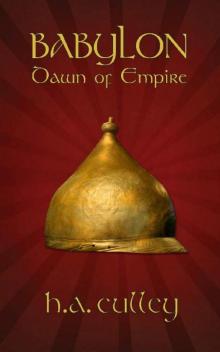 Dawn of Empire
Dawn of Empire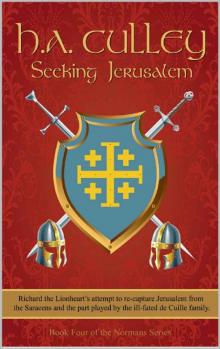 Seeking Jerusalem
Seeking Jerusalem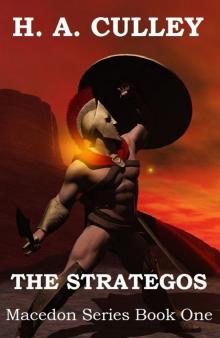 The Strategos
The Strategos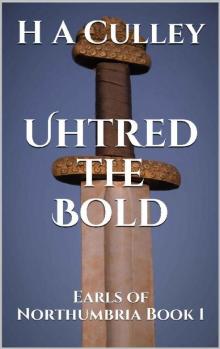 Uhtred the Bold
Uhtred the Bold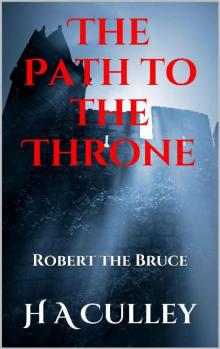 The Path to the Throne
The Path to the Throne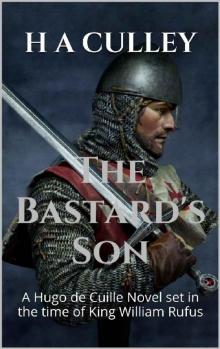 The Bastard's Son
The Bastard's Son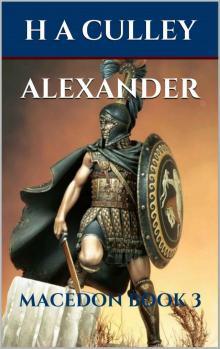 Alexander
Alexander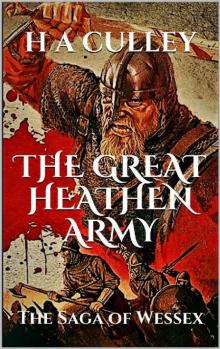 The Great Heathen Army
The Great Heathen Army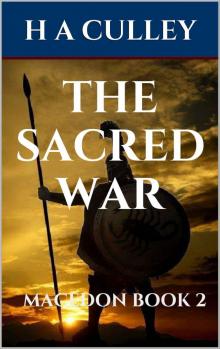 The Sacred War
The Sacred War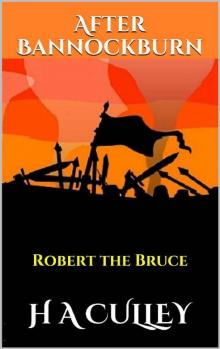 After Bannockburn
After Bannockburn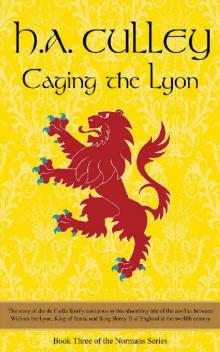 Caging the Lyon
Caging the Lyon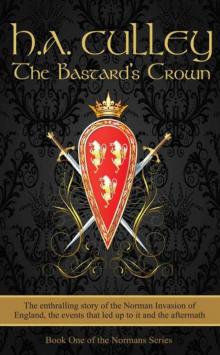 The Bastard's Crown
The Bastard's Crown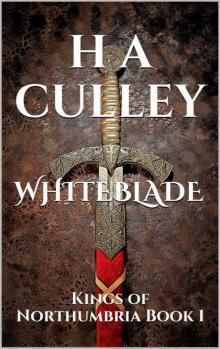 WHITEBLADE
WHITEBLADE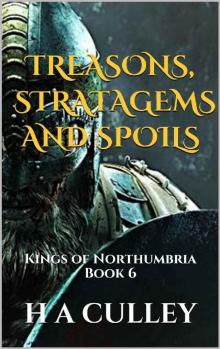 TREASONS, STRATAGEMS AND SPOILS: Kings of Northumbria Book 6
TREASONS, STRATAGEMS AND SPOILS: Kings of Northumbria Book 6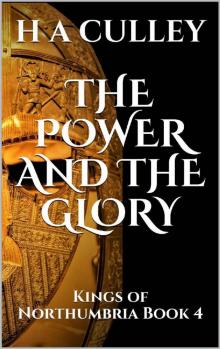 THE POWER AND THE GLORY: Kings of Northumbria Book 4
THE POWER AND THE GLORY: Kings of Northumbria Book 4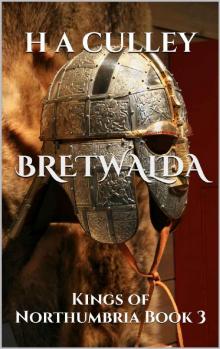 BRETWALDA: Kings of Northumbria Book 3
BRETWALDA: Kings of Northumbria Book 3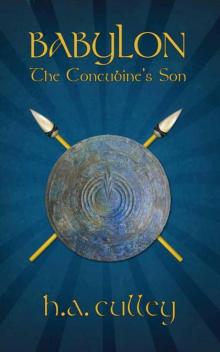 The Concubine's Son
The Concubine's Son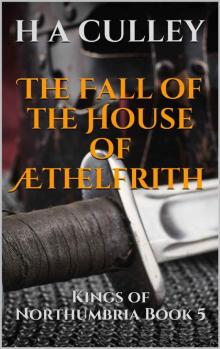 The Fall of the House of Æthelfrith: Kings of Northumbria Book 5
The Fall of the House of Æthelfrith: Kings of Northumbria Book 5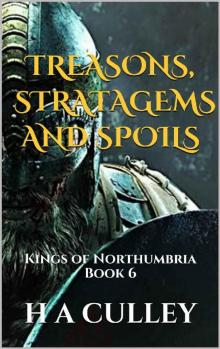 TREASONS, STRATAGEMS AND SPOILS
TREASONS, STRATAGEMS AND SPOILS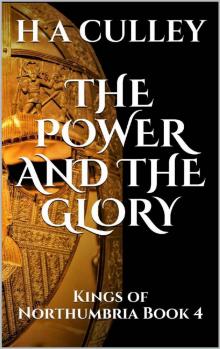 THE POWER AND THE GLORY
THE POWER AND THE GLORY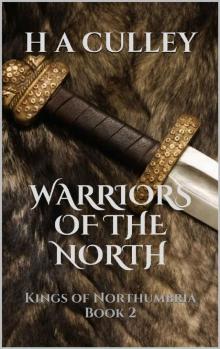 WARRIORS OF THE NORTH
WARRIORS OF THE NORTH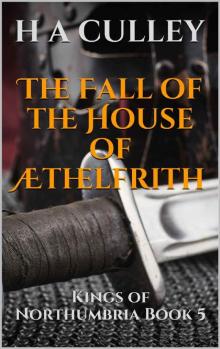 The Fall of the House of Æthelfrith
The Fall of the House of Æthelfrith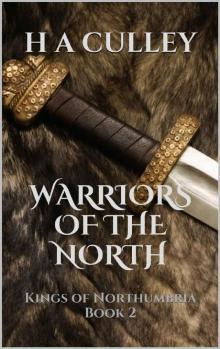 WARRIORS OF THE NORTH: Kings of Northumbria Book 2
WARRIORS OF THE NORTH: Kings of Northumbria Book 2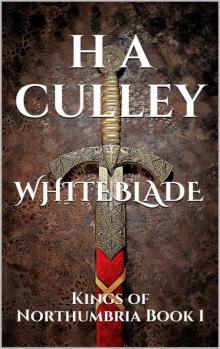 WHITEBLADE: Kings of Northumbria Book 1
WHITEBLADE: Kings of Northumbria Book 1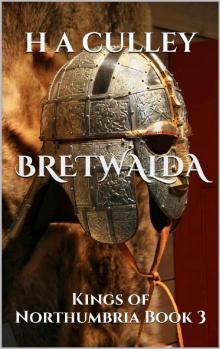 BRETWALDA
BRETWALDA